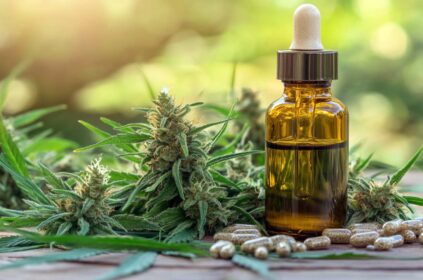Introduction to CBD’s Impact on Bone Health and Osteoporosis
In recent years, CBD (cannabidiol) has emerged as a popular topic of discussion, known primarily for its potential benefits in alleviating anxiety, reducing pain, and improving overall wellness. However, a new frontier in CBD research is illuminating its possible effects on bone health, particularly in managing osteoporosis—a condition that significantly increases the risk of fractures. This article delves into the current understanding of CBD’s influence on bone health, examining its mechanisms, potential benefits, and relevant scientific studies.
The Role of CBD in Bone Health
Bone Formation and Healing
CBD has garnered attention for its role in bone formation and healing, which is crucial for maintaining healthy bone density. Research indicates that CBD stimulates osteoblast activity – cells responsible for new bone formation – while inhibiting osteoclast activity, the cells that break down bone. This balance is essential for maintaining bone health, especially for those at risk of osteoporosis.
For example, a study published in the Journal of Bone and Mineral Research explored how CBD and another cannabinoid, CBG (cannabigerol), enhanced bone formation in animal models. The results showed an increase in osteoblast numbers and acceleration of the mineralization processes, leading to stronger and healthier bone structure.
Anti-Inflammatory Effects
Chronic inflammation is a known contributor to bone loss and conditions like osteoporosis. CBD’s documented anti-inflammatory properties play a pivotal role in combating this inflammation, which can compromise bone integrity. By soothing inflammation, CBD may help protect bones from further deterioration, supporting overall bone health and vitality.
CBD and Osteoporosis
Managing Bone Loss
Osteoporosis results from an imbalance in the bone remodeling process, where the resorption of bone outpaces its formation. Given CBD’s interaction with the endocannabinoid system (ECS), which is integral to bone health, there is hope that it may help rebalance this dynamic. By positively influencing the ECS, CBD could promote the development of more robust bone tissue and aid in repairing bones post-fracture.
Pain Management and Sleep Quality
Living with osteoporosis often accompanies persistent pain that can disrupt one’s quality of life and sleep patterns. CBD has been noted for its ability to alleviate discomfort by modulating pain receptors within the body. This relief not only enhances mobility but can also facilitate better sleep—crucial for recovery and overall well-being. Many individuals report improved sleep following CBD use, attributing this to its calming effects.
Hormonal Regulation
For many postmenopausal women, hormonal fluctuations significantly contribute to the onset of osteoporosis. Some research suggests that CBD may aid in smoothing out these hormonal changes, potentially reducing the risk of further bone loss. This hormonal regulation adds a valuable dimension to CBD’s benefits in the context of bone health.
Scientific Evidence and Research Findings
Enhanced Bone Healing
Extensive research has underscored CBD’s potential to enhance bone healing. In a notable study involving rats with mid-femoral fractures, CBD was shown to promote a more robust healing process—resulting in stronger bones post-fracture and improved mineralization of bone tissues.
Bone Density and Strength
Animal models have also illustrated that CBD can positively influence bone density and strength. Studies have reported increases in bone volume and trabecular thickness while reducing trabecular separation. For instance, a study focused on mice with spinal injuries noted that CBD administration significantly mitigated bone loss and improved overall bone strength.
Comparison with Traditional Treatments
Traditional pain management methods, particularly nonsteroidal anti-inflammatory drugs (NSAIDs), often come with side effects that may hinder the necessary inflammation response during healing. In contrast, both CBD and CBG have been demonstrated to manage pain effectively while allowing the natural inflammatory processes to occur, which are vital for proper healing.
Safety and Future Directions
Safety Considerations
While the findings surrounding CBD are promising, safety remains a priority. It is always essential to consult with a healthcare provider prior to introducing CBD into a health regimen, particularly for individuals with existing health conditions or those taking other medications. The FDA has approved certain CBD formulations for specific conditions, though further research is needed to establish optimal dosages and formulations for bone health applications.
Future Research
As interest in CBD continues to grow, future research is set to explore the cellular and molecular mechanisms underlying CBD’s effect on bone health. Additionally, developing targeted clinical formulations for various populations—including adults with fracture risks—will be crucial in advancing its therapeutic potential.
Conclusion
The potential of CBD to positively influence bone health and aid in the management of osteoporosis is an exciting development within the broader cannabis research landscape. Through promoting bone formation, acting as an anti-inflammatory, managing pain, and possibly regulating hormones, CBD offers a multifaceted approach to supporting bone health.
As scientific inquiry advances, it will be vital for individuals considering CBD as a supplement for bone health to approach this option thoughtfully. Consulting with healthcare professionals and keeping abreast of ongoing research will ensure safe and informed usage of CBD.
Actionable Tips
- Consult a Healthcare Provider: Before incorporating CBD for bone health, discuss with your healthcare provider to determine suitability for your specific situation.
- Choose High-Quality Products: Look for reputable sources to ensure that the CBD products you choose are pure and effective.
- Combine with Traditional Treatments: Consider using CBD alongside traditional osteoporosis treatments, emphasizing a balanced diet rich in calcium and vitamin D, as well as engaging in regular weight-bearing exercises.
- Stay Informed: Regularly review the latest research and clinical findings to understand the evolving role of CBD in supporting bone health.
By integrating CBD thoughtfully into a comprehensive approach to bone health, individuals may empower themselves to manage osteoporosis effectively, maintaining strong and resilient bones.




















